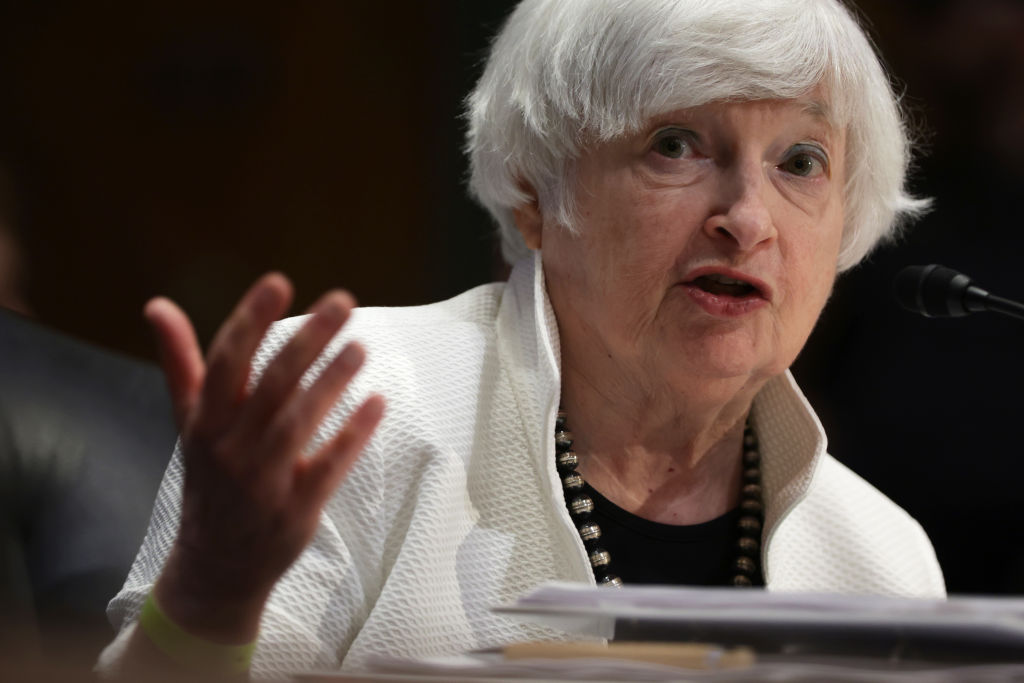
Treasury Secretary Janet Yellen said on Wednesday that the Treasury Department was not currently talking to investors about what would happen if a deal on the debt ceiling isn’t reached and the U.S. defaults, affirming her belief that an agreement is possible and emphasizing the necessity for a resolution by the June 1 deadline.
“We are committed to not having missed payments and raising the debt ceiling,” she said while speaking at The Wall Street Journal’s CEO Council Summit via video link. She said the Treasury Department is not currently in conversations with investors about what might happen if the U.S. does miss payments. “We’re not involved in planning for what happens if there’s a default.”
Read More: What to Know About the History of the Debt Ceiling
As President Joe Biden and Speaker of the House Kevin McCarthy continue negotiations over raising the federal debt ceiling, Yellen reaffirmed Wednesday that the Treasury would be unlikely to meet all U.S. government payment obligations as early as June 1, without a congressional decision to raise the $31.4 trillion debt ceiling. Without such action, a U.S. default would be triggered.
Yellen said that the agency is working to reach a more precise forecast to give Congress for the exact date the U.S. is expected to run out of financial resources.
The Treasury Secretary did not specify the kinds of prioritization that be required if a deal is not reached, but noted that the situation would not be operationally feasible for the government. “We will default on some obligation, and that’s really not an acceptable state of affairs,” she said. “It threatens the strong recovery that we have in the U.S. economy. It threatens financial markets. We simply have to raise the debt ceiling.”
Yellen also spoke about the recent turmoil in the U.S. banking sector. She said JPMorgan Chase’s recent acquisition of failing First Republic Bank had been a necessary, but not ideal move for the health of the U.S. banking system. Earlier this month, San Francisco-based First Republic Bank became the third U.S. bank to shutter in just two months, with JPMorgan acquiring most of the bank’s assets in a weekend deal shepherded by the Federal Deposit Insurance Corporation (FDIC). It followed government takeovers of Silicon Valley Bank and Signature Bank in March.
“In general, seeing greater concentration among the largest banks is not something that’s desirable,” Yellen said of JPMorgan Chase’s merger with First Republic Bank. “But the FDIC, in resolving a company, is…required to take the best bid for a failing bank. And in this case, that was the bid of JPMorgan Chase.” She added, “We want to make sure that there is healthy competition throughout the economy, including in the banking system, but this was something that the FDIC was required to do.”
More from TIME
As the U.S., along with many other countries, continues to face stubborn inflation, Yellen remained hopeful that relief could be on the way, noting that certain factors, such as a tight labor market and high rental costs, have been critical in pushing up inflation rates. “We’ve seen housing price increases taper off. The prices of new newly rented apartments [has] stabilized and over time, I think that will show up in bringing core inflation down further,” she said, “The labor market is also arguably loosening up a little bit, becoming a bit less hot.”
More Must-Reads from TIME
- Cybersecurity Experts Are Sounding the Alarm on DOGE
- Meet the 2025 Women of the Year
- The Harsh Truth About Disability Inclusion
- Why Do More Young Adults Have Cancer?
- Colman Domingo Leads With Radical Love
- How to Get Better at Doing Things Alone
- Michelle Zauner Stares Down the Darkness
Write to Simmone Shah at simmone.shah@time.com